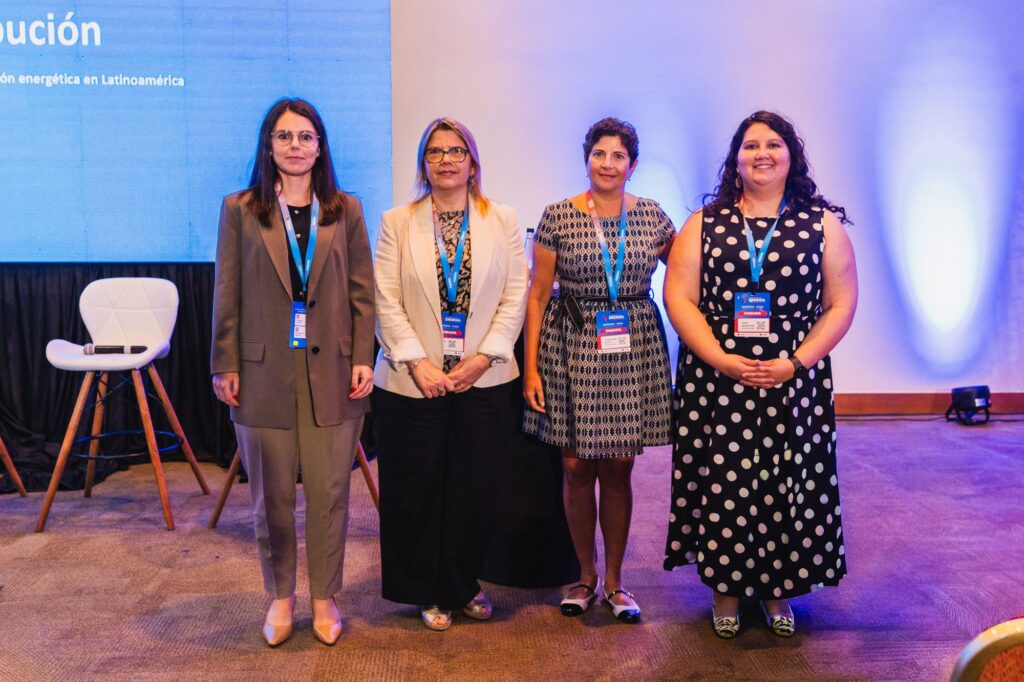Home / Alinnea Presents Its Report on Green Investments in Latin America at OLADE’s Energy Week

OLADE’s Energy Week has once again established itself as the most relevant political and technical forum for the energy sector in Latin America and the Caribbean. Held in Santiago de Chile from September 30 to October 3, the event brought together more than 2,500 participants from 49 countries, including the Energy Ministers of OLADE’s 27 member states, along with representatives from international organizations, companies, universities, trade unions, and civil society organizations.
This unique event serves as a platform to discuss the major challenges of the regional energy agenda, covering topics such as the just energy transition, supply security, technological innovation, and opportunities for biregional cooperation. In this context, Alinnea played a prominent role by presenting its report “Accelerating Investments in Green Industry in Latin America: Recommendations from Multistakeholder Dialogue,” and through the participation of Gemma Bedia, Climate Change Expert at the organization, in a roundtable dedicated to incentives for private investment in energy efficiency.
OLADE’s Energy Week is the central platform for political and strategic dialogue on energy in Latin America and the Caribbean. This year’s edition brought together 220 panelists and 160 international organizations to debate the region’s energy transition priorities.
Among the main milestones was the Annual Meeting of OLADE’s Ministers of Energy, where important “Ministerial Decisions” were approved on topics such as energy and labor, regional regulatory dialogue, just transition with local communities, and energy storage. Additionally, most countries in the region committed to achieving 95% access to clean cooking technologies in Latin America and the Caribbean, with national roadmaps adapted to each socio-economic context.
For the first time, this edition of Energy Week featured the participation of the European Commission as an observer, represented by Cristina Lobillo, Director for Energy Security and International Relations at the Directorate-General for Energy. The European presence highlighted the growing interest in strengthening strategic cooperation between the European Union and Latin America on just transition, sustainable investment, and energy security—key areas that align directly with the proposals presented in Alinnea’s report.
Within the framework of the event, Alinnea presented its report “Accelerating Investments in Green Industry in Latin America: Recommendations from Multistakeholder Dialogue,” at a meeting held at the International Labour Organization (ILO) headquarters in Santiago de Chile.
The document compiles the conclusions of the working group promoted by Alinnea between June and September 2025, which gathered more than forty representatives from governments, companies, multilateral organizations, and academia. Its objective: to identify concrete measures to mobilize investments in green industry in Latin America and the Caribbean.
The report starts from a clear diagnosis: the region needs to multiply its annual investment in climate action by eight to ten times to meet its decarbonization commitments. Currently, the flows directed toward ecological transition represent only 0.5% of regional GDP, compared to the 3.7–4.9% required to meet climate goals by 2030.
Among the main bottlenecks identified, the report highlights the insufficiency of public capital, institutional fragmentation, poor integration of climate objectives into economic policies, technological and infrastructure deficits, and limited citizen participation in project design.
Based on this analysis, Alinnea proposes five strategic lines of action:
Harmonize regulatory frameworks and create common green taxonomies, ensuring the participation of local communities, Indigenous peoples, and SMEs.
Deploy innovative financial instruments, such as sovereign green bonds, biregional funds, or debt-for-nature swaps.
Invest in critical infrastructure (electric transmission, storage, recycling) and specialized human capital through green jobs training programs.
Strengthen climate and financial information systems, standardizing sustainability reporting.
Consolidate biregional cooperation between Latin America and the European Union through climate governance mechanisms, green diplomacy, and shared macroeconomic observatories.
The report will soon be available on Alinnea’s website.
In addition to presenting the report, Alinnea was invited to participate in the roundtable “What Encourages the Private Sector to Invest in Energy Efficiency in Latin America and the Caribbean?” where Gemma Bedia, Climate Change Expert at the organization, discussed the role of the private sector and biregional cooperation in closing the climate finance gap.
Bedia emphasized that “the climate finance gap in Latin America is very deep: the region needs between 3.7% and 4.9% of its annual GDP until 2030 to meet its commitments, and today it barely reaches 0.5%. Private investment is therefore essential to bridge that gap.”
However, she noted that the challenge is not only the amount of capital mobilized but also its destination: “The issue is not just how much capital is mobilized, but where and for whom. If energy efficiency is limited to projects by large corporations, we will reproduce inequalities. The green transition must also be a driver of social and territorial cohesion.”
In this regard, she advocated for inclusive financial mechanisms that bring the benefits of the energy transition closer to SMEs, cooperatives, municipalities, and households. “From microcredits for clean technologies to green mortgages or guarantees that allow small producers to access capital: private investment in energy efficiency not only bridges the financial gap but also multiplies the benefits in employment, social inclusion, and local resilience,” she explained.
Regarding biregional cooperation, Bedia stressed that “cooperation between Latin America and the Caribbean and the European Union is especially strategic to achieve the Paris Agreement objectives.” She added that “the lack of common standards and regulatory fragmentation create uncertainty and increase financing costs in the region. Therefore, biregional cooperation can serve as a bridge—transferring European standards, supporting regional green taxonomies, and mobilizing resources from the Global Gateway.”